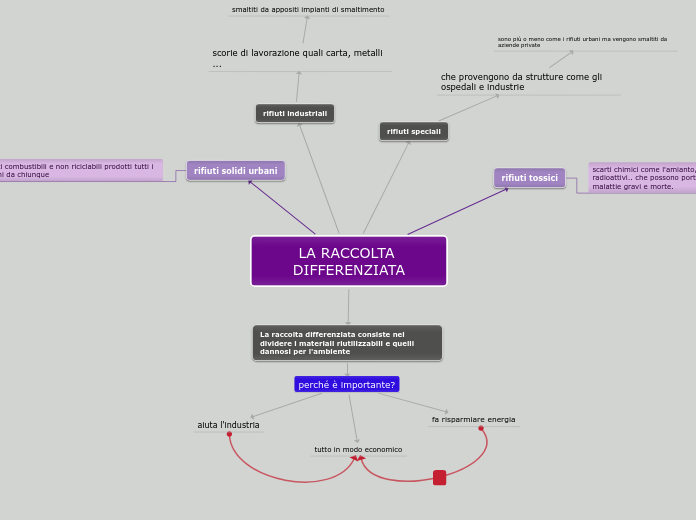What next?
What to do next?
Congratulations, you've just finished mapping your SMART goals for the following year.
What to do next:
- save this smart map as a regular mind map, and make further adjustments using other Mindomo features
- print it and post it in various places in your home and office as a reminder of your yearly plan
- use it as a basis for detailed planning and scheduling of your tasks. There are more features in Mindomo that can help you with this.
LA RACCOLTA DIFFERENZIATA
Why is it important to plan your year ahead?
Planning ahead for the next year has some highly important benefits: it contributes to your personal and business growth; it helps you set priorities and focus on them; you get to prevent all sorts of risks and get accustomed with change.
rifiuti speciali
che provengono da strutture come gli ospedali e industrie
sono più o meno come i rifiuti urbani ma vengono smaltiti da aziende private
rifiuti industriali
scorie di lavorazione quali carta, metalli ...
smaltiti da appositi impianti di smaltimento
La raccolta differenziata consiste nel dividere i materiali riutilizzabili e quelli dannosi per l'ambiente
A goal refers to an expected outcome that has one or several specific objectives which have to be achieved within a designated time frame. Regarding the time frame, goals can either be long-term goals, or short-term goals. These two basic categories can be further sub-divided:
- lifetime goals: part of long-term goals, these are major goals that have accomplishment dates of ten or more years in the future;
solving, innovation, or some type of improvement;
- capstone goals: key goals that need to be accomplished first before your lifetime goals. Their time frame is between one to ten years.
- foundational goals: short-term goals that can be achieved in less than a year;
- provisional goals: also known as stepping-stone goals, these goals can be accomplished in less than a month.
Remember that goals should relate to accomplishments (therefore the result), not activities.
perché è importante?
S.M.A.R.T. is an acronym and it stands for:
- S - specific: Who? What? When? Where? Why?
- M - measurable: defining quantity,
quality, cost, etc.
- A - achievable: a feasible goal
- R - relevant: important
- T - time-bound: intermediate and final deadlines.
tutto in modo economico
aiuta l'industria
fa risparmiare energia
rifiuti solidi urbani
Review your past year
to see what you achieved and what areas you still want to improve. Do you have any regrets?
rifiuti combustibili e non riciclabili prodotti tutti i giorni da chiunque
gestiti dalla pubblica amministrazione
What are your achievements in the past year?
Think of the major events that took place. What are you proud of/excited about?
rifiuti tossici
What do you have in mind for the following year?
Taking into consideration the year that has just passed, it's time to make new, bigger, bolder plans. Will you change the city/country you are living in? Are there any new skills you are planning to acquire? Are you taking a new career step?
scarti chimici come l'amianto, i materiali radioattivi.. che possono portare malformazioni, malattie gravi e morte.
questi non possono esser smaltiti nelle discariche infatti prima vengono trattati per levare loro la tossicità
Choose several areas in which you are prepared to make a huge difference this year. Consider taking just a few, maybe just 2 or 3 areas. Having too may areas to focus on would imply a waste of your energy. List them and choose icons to set their priority levels:
critical
high
medium to high
medium to low
low
familynew careertravelingparentingcommunicationstress-managementvolunteeringeducation




